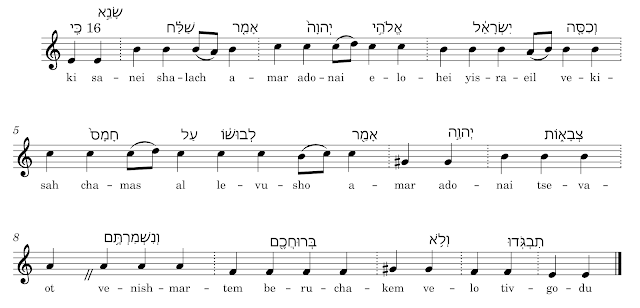Claude Mariottini again asks a question on Bible translation. This struck me as a good one. And it raised questions about my own translating -- as it should. James McGrath also noted Claude's post on Twitter. I'm following war correspondents so I read Twitter more often these days.
Here's the verse.
ci-wna wlk amr ihvh alohi iwral vcish kms yl-lbuwo amr ihvh xbaot // vnwmrtm brukcm vla tbgodu
There is emphasis on the hate in the music with its declamatory rise to the dominant. This follows an appeal on the 6th as reciting note - supporting the narration, says Yahweh the God of Israel. Then it continues on the dominant with further appeal concerning the consequences of the action that is hated. The phrase comes to a rest with the parallel repetition of says Yahweh of hosts. The phrasing suggests that כִּֽי־שָׂנֵ֣א שַׁלַּ֗ח ci-wna wlk should be read in parallel with וְכִסָּ֤ה חָמָס֙ עַל־לְבוּשׁ֔וֹ vcish kms yl-lbuwo. Is the vav additive or contrastive? I.e. should it be rendered and or but? Translations that mess with the word order will force a single reading.
What is the object of hate? Is it right to translate it as a direct
object when there is no marker in the Hebrew. (It might well be fine. See
below.) And who is doing the hating? Equally when the text says vcish kms
yl-lbuwo, who is doing the covering of violence with his clothing? Is Yahweh
speaking of himself in the third person?
I find here the repetition of 'meaningful' glosses to be confusing. There are multiple roots interpreted as divorce in the canon. What we have here is 'sending away', /wlk/, (shalach). This can have the force of the idea of divorce. It is a very commonly used word and it does not usually imply divorce. In any case, the root /grw/ I (and others) is already in use for divorce, so I would not use it here.
Interestingly, the archaic KJV uses divorce (divorcement) four times, always in the form derived from /crt/ and divorced 3 times for /grw/. I combed out these tangles: /grw/ is also frequently used and has the sense of expel (a sense that /wlk/ could also carry but I maintain the distinction of these two roots in translation as I do for 98% of the nominal and verbal roots). /crt/ is cut. It too could 'mean' divorce - but it doesn't usually 'say' that.
So what's going on here? Claude suggests citing other scholars with reason that it might be a generic continuous thought - one who hates and sends away covers his garment with violence.
This is extreme in my opinion. This is saying that Yahweh is laying down a consequence of hating and sending away. Perhaps, but the reversal of the object (I read covers violence with his garment) seems contorted. There is no direct object marker. Malachi is speaking prophetically and poetically, and the object marker is used proportionally less frequently in prophetic speech and poetry than narrative.
The range of proportionality of the use of the object marker /at/ is from 39.9 per 1000 words in Exodus to 3.6 in Proverbs. Psalms is 7 per 1000, Malachi is 21.7 -- somewhere in the middle. So I am inclined to keep the word order, and yes I think the prophet is reporting Yahweh's speech in the third person, gently indicating the cost that Yahweh assumes to cover violence in the treachery of misappropriated covenant promises.
This is both a tender and a terrible passage. Terrible because treachery and putting the covenant partner away are part of our inner dialogue, and tender because God is our protector and our partner's protector in spite of ourselves, and Yahweh takes on the burden of our actions. That seems to make sense of the conundrum in verse 17.

|
|
Malachi 2:17 Consider the tenderness of the final verse and its engagement of the contradictions of human nature. |

No comments:
Post a Comment